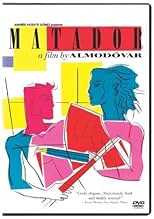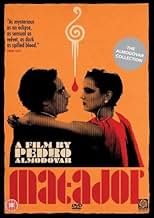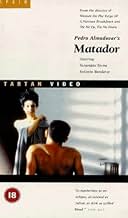A matador is wounded by a bull and can no longer kill in the arena. It is just one of the problems of one of the characters that unexpectedly collide in this film.A matador is wounded by a bull and can no longer kill in the arena. It is just one of the problems of one of the characters that unexpectedly collide in this film.A matador is wounded by a bull and can no longer kill in the arena. It is just one of the problems of one of the characters that unexpectedly collide in this film.
- Awards
- 6 wins & 7 nominations total
Nacho Martínez
- Diego
- (as Nacho Martinez)
Bibiana Fernández
- Vendedora Flores
- (as Bibi Andersen)
Verónica Forqué
- Periodista
- (as Veronica Forque)
Mercedes Jiménez
- Alumna 3ª
- (as Mercedes Jimenez)
Francesca Prandi
- Alumna 4ª
- (as Francesca Romana)
Featured reviews
Before I saw this movie in late 80-s I knew something about culture, tradition and 'spirit' of Spain, the country which inspired me for years. This movie made an enormous impression on me as it gave me very deep insight into 'real Spanish spirit', i.e. what does death mean to Spanish people in the light if their tradition and culture.
The personality of ex-matador and his behaviour underlined by his words - 'to stop to kill means to dye for me', on the other hand a high class woman being 'infected' with death, treating Diego as her God of Death, and these two 'lost worlds' slowly approaching each other into a fatal bitter end, which was filled with the most beautiful tune ever made (Esperame en el cielo mi corazon...) all this creates an unforgettable and distinctive impression after watching this movie.
Pedro Almodovar you gave us a great piece of art, I believe there are some more pictures that you can bring to us in the future.
Thanks Pedro..............
The personality of ex-matador and his behaviour underlined by his words - 'to stop to kill means to dye for me', on the other hand a high class woman being 'infected' with death, treating Diego as her God of Death, and these two 'lost worlds' slowly approaching each other into a fatal bitter end, which was filled with the most beautiful tune ever made (Esperame en el cielo mi corazon...) all this creates an unforgettable and distinctive impression after watching this movie.
Pedro Almodovar you gave us a great piece of art, I believe there are some more pictures that you can bring to us in the future.
Thanks Pedro..............
I am not sure what to expect when the opening scene is a man masturbating to torture porn, a term that was probably not even invented in 1988.
From there we go to alternating clips of Antonio Banderas asking the ex-bullfighter Nacho Martínez about women and he compares getting a woman to bullfighting, while we watch someone do exactly that. We are no, of course, prepared for the necrophilia twist in that encounter.
We find our boy, Antonio, and he is a boy in this film, in a strict Catholic household. I would have to guess that his mother was Opus Dei. He attempts to rape his neighbor and confesses to four murders which we know he did not do. This is just Almodóvar's take on religion and repression. He revisits that subjects again in the film, so it must me a theme for him.
But, then the story shifts to Nacho and Assumpta Serna, with Eva Cobo in a minor role. This is where the story gets interesting with the police trying to solve the four murders and the real murderers trying to lay it on Antonio.
It gets bizarre at the end with Antonio seeing the killers in his mind and leading the police to them. But, they arrive too late as the climax of sex and death occurs simultaneous with an eclipse. How weird is that?
From there we go to alternating clips of Antonio Banderas asking the ex-bullfighter Nacho Martínez about women and he compares getting a woman to bullfighting, while we watch someone do exactly that. We are no, of course, prepared for the necrophilia twist in that encounter.
We find our boy, Antonio, and he is a boy in this film, in a strict Catholic household. I would have to guess that his mother was Opus Dei. He attempts to rape his neighbor and confesses to four murders which we know he did not do. This is just Almodóvar's take on religion and repression. He revisits that subjects again in the film, so it must me a theme for him.
But, then the story shifts to Nacho and Assumpta Serna, with Eva Cobo in a minor role. This is where the story gets interesting with the police trying to solve the four murders and the real murderers trying to lay it on Antonio.
It gets bizarre at the end with Antonio seeing the killers in his mind and leading the police to them. But, they arrive too late as the climax of sex and death occurs simultaneous with an eclipse. How weird is that?
The connection between sex and death is not a novel one. Elizabethan poetry would occasionally use the latter as a metaphor for the former. Pedro Almodóvar's sixth feature is about three people who have erased the line between the two: Nacho Martinez, a matador gored in the ring, who now teaches students on the art; Antonio Banderas, one of his pupils; and Assumpta Serna, a lawyer defending Banderas who is charged with raping and killing two girls.
In other words, it's one of Almodóvar's movies about the weird kinks of the world. This time, however, he is not concerned with the people at the edge of Spanish society, but at the center of the normal world... assuming there is such a thing. We are all weird, we all act outside the norms, and the people we respect can be the most bizarre.
It's rather slow-moving for one of his movies, probably because this is not one of his shock comedies - although there are comic elements. Visually, it is sumptuous, with a focus on colors, particularly bright reds that draw one's eyes. Miss Serna is a sharp dresser, and she wears a cape in several scenes, which she whirls like a bullfighter going in for the kill.
Is Almodóvar decrying bullfighting? Or in favor of consensual activity of whatever sort? Has he simply presented his bizarre story, and left his audience to draw the moral conclusions it chooses? Or is this simply the sort of story he likes to tell? I think the last is true, but there's nothing simple about it.
In other words, it's one of Almodóvar's movies about the weird kinks of the world. This time, however, he is not concerned with the people at the edge of Spanish society, but at the center of the normal world... assuming there is such a thing. We are all weird, we all act outside the norms, and the people we respect can be the most bizarre.
It's rather slow-moving for one of his movies, probably because this is not one of his shock comedies - although there are comic elements. Visually, it is sumptuous, with a focus on colors, particularly bright reds that draw one's eyes. Miss Serna is a sharp dresser, and she wears a cape in several scenes, which she whirls like a bullfighter going in for the kill.
Is Almodóvar decrying bullfighting? Or in favor of consensual activity of whatever sort? Has he simply presented his bizarre story, and left his audience to draw the moral conclusions it chooses? Or is this simply the sort of story he likes to tell? I think the last is true, but there's nothing simple about it.
If you're a fan of Pedro Almodovar, you'll love this one from 1986.. filmed in Madrid, it has all the usual elements: offbeat characters who meet up and get even crazier, like atoms smashing together. when a young matador Angel (Antonio Banderas at 26) thinks his heroes have committed crimes, he confesses to them to take the fall. watch that opening scene.. .pretty rough stuff: (simulated) sex, nudity, and murder, all in one. his lawyer has her own kinky issues, and wants to defend Angel. Look for the usual Almodovar cast, with Carmen Maura and Chus Lampreave. Assumpta Serna is the sexy, flirty, over-sexed Maria. and the gory bullfights, which play a big part in the story. Secrets. everyone has their secret. which ones will come out? Liaisons... more secrets. will the police find the real killer(s)? it's very good. intrigue.
Every Artist has a reoccurring theme, that he successfully or unsuccessfully explores and tries to capture through out his life time, and that eventually becomes his, what we might call - style. With Ingmar Bergman it's the detachment from life and confronting death, with Woody Allen, the comical absurdity of man-woman relationship, with Filliny it's the nostalgia for the lost, often irreplaceable innocence of childhood. In case of Pedro Almodovar though, to put it lightly, it's unorthodox, sex crazed love stories. (love that guy!)
I had watched three films by him (Bad Education, Law Of Desire, Talk To Her), and all of them were rather twisted, but this one is defiantly the weirdest love fable I had ever seen or read even by his standards.
The story begins with a young man, (played by heavenly-gorgeous, 18 year old Antonio Banderas) who is studying to be a matador, under a world famous, but retired, due to an injury, Maestro. One night after being suspected of being a homosexual, he decides to prove his masculinity and toughness by attempting to rape Maestro's girlfriend. But being in reality a very innocent and tender soul, he literally faints before anything happens, when she accidentally cuts her finger.
The girls reports him, and while being questioned, the cops hang on him three more murders. Apparently there have been bodies popping up through out the city, with all the victims assaulted in the same strange manner - at the height of their sexual arousal, they are stabbed in the back of their necks, with a hair pin, with the same technique a toreador brings a bull down.
And now, brought together by serendipity, the female lawyer, who had come to defend Antonio, and is investigating the case, is beginning to have a sort of an "affair" with the Maestro. Both of them being obsessed with sex, violence and mostly important death, which they find the most arousing thing in the world. Imagine Romeo and Juliet, only where they both not only desire each other sexually, but also long for each other's death.
I had personally often wondered, why the element of violence is so often present in sex. Even when one makes love, no matter how gentle, there will be some hair pulling, slight choking or biting. To experience pain and dominance, seems to be counterintuitive to receiving pleasure, yet something in our wiring arouses us by that. With books like "Fifty Shades Of Grey' bondage and sadomasochism had become house hold names, and practices. But what I can't wrap my brain around is why do these seemingly, logically unpleasant activities arouse us?
The theme in this film, of the desire to kill the one you love, and to define death and brutal violence as sexy, that is bound to make an indelible imprint on your soul and to stay with you for the rest of your life.
I had watched three films by him (Bad Education, Law Of Desire, Talk To Her), and all of them were rather twisted, but this one is defiantly the weirdest love fable I had ever seen or read even by his standards.
The story begins with a young man, (played by heavenly-gorgeous, 18 year old Antonio Banderas) who is studying to be a matador, under a world famous, but retired, due to an injury, Maestro. One night after being suspected of being a homosexual, he decides to prove his masculinity and toughness by attempting to rape Maestro's girlfriend. But being in reality a very innocent and tender soul, he literally faints before anything happens, when she accidentally cuts her finger.
The girls reports him, and while being questioned, the cops hang on him three more murders. Apparently there have been bodies popping up through out the city, with all the victims assaulted in the same strange manner - at the height of their sexual arousal, they are stabbed in the back of their necks, with a hair pin, with the same technique a toreador brings a bull down.
And now, brought together by serendipity, the female lawyer, who had come to defend Antonio, and is investigating the case, is beginning to have a sort of an "affair" with the Maestro. Both of them being obsessed with sex, violence and mostly important death, which they find the most arousing thing in the world. Imagine Romeo and Juliet, only where they both not only desire each other sexually, but also long for each other's death.
I had personally often wondered, why the element of violence is so often present in sex. Even when one makes love, no matter how gentle, there will be some hair pulling, slight choking or biting. To experience pain and dominance, seems to be counterintuitive to receiving pleasure, yet something in our wiring arouses us by that. With books like "Fifty Shades Of Grey' bondage and sadomasochism had become house hold names, and practices. But what I can't wrap my brain around is why do these seemingly, logically unpleasant activities arouse us?
The theme in this film, of the desire to kill the one you love, and to define death and brutal violence as sexy, that is bound to make an indelible imprint on your soul and to stay with you for the rest of your life.
Did you know
- TriviaPedro Almodóvar: In the scene of the backstage dressing room, as "Francisco Montesinos".
- Quotes
Francisco Montesinos: I've told you not to shoot up in the dressing rooms!
- ConnectionsFeatured in Playboy: The Story of X (1998)
- How long is Matador?Powered by Alexa
Details
- Release date
- Country of origin
- Official sites
- Language
- Also known as
- 鬥牛士
- Filming locations
- Viaducto de Segovia, Madrid, Spain(Bridge where Maria and Diego talk.)
- Production companies
- See more company credits at IMDbPro
Box office
- Gross US & Canada
- $279,394
- Opening weekend US & Canada
- $13,399
- Aug 13, 2006
- Gross worldwide
- $286,126
Contribute to this page
Suggest an edit or add missing content


































